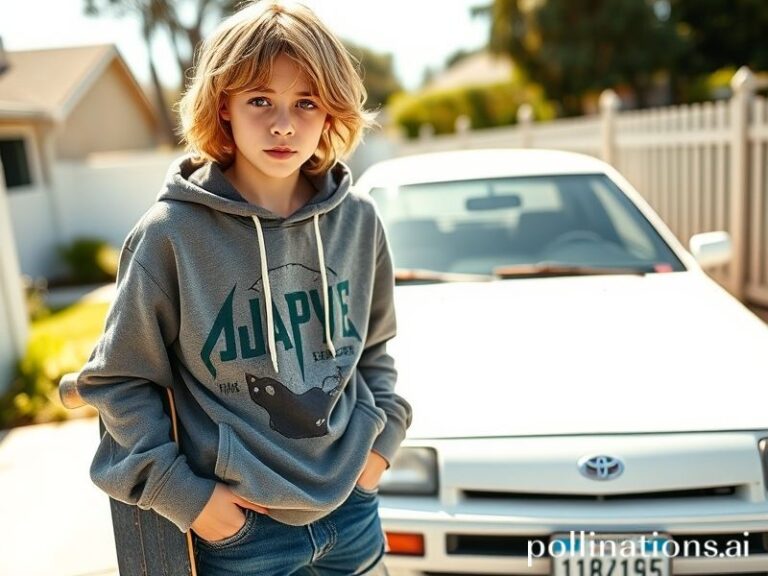Okurrr-pocalypse Now: How Cardi B Became the Accidental Empress of Post-Truth Soft Power
From the Files of the Global Cultural Attaché: A Dispatch on Belcalis Marlenis Almánzar, A.K.A. Cardi B
It is 2:07 a.m. in Dubai, the hour when the Burj Khalifa’s LED façade usually cycles through stock-market quotes and tourist selfies. Tonight, however, it flashes hot-pink lyrics in Comic Sans: “Okurrr.” Somewhere in Lagos, a danfo bus blares the same syllable from tinny speakers, prompting a roadside preacher to pause mid-sermon and wonder if the Rapture now comes with onomatopoeia. Meanwhile, in Ulaanbaatar, a teenager wearing knock-off Balenciaga live-streams herself lip-syncing “WAP” while her grandmother milks a yak in the background, blissfully unaware that the song has been banned in twelve countries for crimes against delicate sensibilities.
Welcome to the planetary reign of Cardi B, the Bronx-born former stripper who has become the UN Secretary-General of unfiltered id.
When historians of late capitalism sift through the rubble of our era, they will find two artifacts perfectly preserved in the same amber of algorithmic inevitability: a half-eaten Tide Pod and a screenshot of Cardi twerking on a piano in Paris wearing couture that costs more than Moldova’s annual defense budget. One object screams, “We ate poison for clicks”; the other purrs, “We monetized libido.” Both are, in their own ways, diplomatic cables from a civilization that decided shame was too expensive to warehouse.
Cardi’s genius lies not in the booty-centric choreography—humanity has been shaking what evolution gave it since the first cave DJ dropped a mammoth-rib xylophone beat—but in her ability to weaponize confession as soft power. While traditional embassies issue demarches about tariffs, she live-tweets her postpartum hair-loss remedies. Where the World Bank offers sober white papers on gender equity, she interrupts congressional hearings via Instagram stories to ask why childcare costs more than a Birkin. Diplomats call it “track-two diplomacy”; Cardi calls it Tuesday, and Tuesday trends worldwide.
Look at the receipts. In 2021, when the Ghanaian government briefly banned her song “Press,” local streaming numbers jumped 300 percent, proving once again that prohibition is just influencer marketing with a police escort. In Malaysia, her lyrics are translated into Bahasa and quoted in parliamentary debates about morality policing—an irony not lost on the MPs who privately DM her for concert tickets. Even the Vatican’s unofficial Spotify playlist (yes, it exists; yes, it slaps) slipped in “I Like It” between Gregorian chants, perhaps as an act of ecumenical thirst-trapping.
Economists at the IMF—bored with measuring productivity in soul-crushing units like “widgets per hour”—now track the “Cardi Effect”: every time she shouts out a country, its tourism board registers a statistically significant uptick in flight searches. Croatia, accidentally tagged in a blurry vacation photo, saw a 12 percent spike in yacht rentals. The Croatian minister of tourism tried to issue a formal thank-you but got distracted when Cardi replied, “Y’all got good oysters?” Diplomacy, like everything else, now runs on serotonin and seafood.
Yet the darker joke is on us. Cardi B’s rise coincides with the precise historical moment when trust in every other institution cratered. Banks launder billions and get bonuses; presidents tweet nuclear threats between golf rounds; climate scientists are ratioed by oil executives on TikTok. Into that vacuum struts a woman who at least admits she wants your money and your attention, preferably in that order. Radical honesty sells because deceit has become background radiation.
So when she raps, “I make money moves,” she is not just boasting; she is reciting the new global anthem, the lingua franca of a planet where citizenship is measured in followers and GDP is tracked in OnlyFans subscriptions. The International Space Station orbits overhead, broadcasting Cardi’s latest single to astronauts who left Earth to escape the noise, only to discover the Wi-Fi reaches low-Earth orbit. Even the void has a playlist now.
As dawn breaks over the Pacific, a cargo ship stacked with counterfeit Cardi merch steams toward Valparaíso. In its metal belly lie thousands of T-shirts emblazoned with the phrase “Coronavirus couldn’t cancel me.” The shirts are destined for markets where the pandemic was never the leading cause of death—poverty was—but irony, like the virus, travels asymptomatically.
And so the beat drops on another day in the Anthropocene. Somewhere, a diplomat drafts a cable analyzing Cardi’s impact on U.S. soft power. The subject line: “Booty as Security Strategy.” It will be classified, then leaked, then memed. By lunchtime, the meme will have its own cryptocurrency. By dinner, the currency will collapse, but the meme will live forever, preserved in the blockchain like a digital fossil, proof that we were here, that we danced, that we monetized the end of the world one “Okurrr” at a time.







